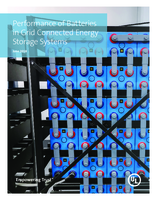
Performance of Batteries in Grid Connected Energy Storage Systems
Helping enhance the overall safety of batteries by managing short-circuiting, overheating and thermal runway risks.

We offer testing of battery products for use in a variety of motive or transportation-related applications. Through electrical, mechanical and environmental testing, we can evaluate the ability of large batteries to safely withstand simulated abuse conditions based on your specified charge and discharge parameters.
We work with industry stakeholders to design Standards that help mitigate the potential risk of fire and electrical hazards, and enhance the overall safety of batteries for electric vehicles.
To address the key industry challenges, we offer two Standards for large format batteries in EV:
In addition, we have developed a Standard to address larger battery packs intended to replace traditional engine-generated power or to be used when a grid-connected power source is unavailable. UL 2743, the Standard for Portable Power Packs, can address a variety of battery uses, ranging from automotive jump-starters to survival backup power systems.
We can test and certify lead-acid, lithium and other forms of electrical, electrochemical, thermal and mechanical energy used in uninterrupted power supply (UPS) and energy storage devices.
We published the first safety standard, UL 9540, the Standard for Energy Storage Systems (ESS) and Equipment. The Standard includes electrical, electrochemical, mechanical and other types of energy storage technologies for systems intended to supply electrical energy. UL 9540 covers a comprehensive review of energy storage systems, including charging, discharging, protection, control, communication between devices, fluids movement and other aspects.
UL 9540 provides a basis for the safety of ESS that includes reference to critical technology safety standards and codes, such as UL 1973, UL 1741, IEEE 1547 and 1547.1, CSA FC1, NFPA 70, NFPA 2, ASME Boiler and Pressure Vessel Code, and ASME B31 piping codes. UL 9540 includes additional criteria to address materials, enclosures, including walk-in enclosures, controls, piping, utility grid interaction, including special purpose interactive systems, hazardous moving parts, signage and instructions.
We help you achieve ESS certification through a product testing engagement, typically for off-the-shelf ESS products, or through an on-site, non-destructive field evaluation for unique systems.
We address the risks of stationary batteries by evaluating to UL 1973, the Standard for Batteries for Use in Stationary Vehicle Auxiliary Power and Light Electric Rail Applications. We also provide advisory or additional testing services to facilitate your entrance into targeted country markets.
Our functional safety for battery management systems service tests the safety of the sophisticated software crucial to the proper and safe functioning of the battery module or pack, along with how the battery interacts with the system as a whole. Our functional safety certification helps prevent the costly consequences of malfunction and provide everyone in the product value chain with peace of mind.
Our scientists are continually developing new methods to help promote the safe use of lithium-ion batteries. As an example, we developed a unique thermal model of the common 18650 lithium-ion battery cell that enhances our ability to mathematically simulate, explore and understand the causes and severity of internal short circuits.
We have also applied our materials science expertise to develop a testing approach that establishes a more robust evaluation of lithium-ion battery separators. Additionally, we established a comprehensive thermal analysis capability that enables us to identify and measure exothermic and endothermic reactions within a lithium-ion battery cell.
We test and certify battery modules and packs to diverse standards. We also assist with transportation and regional standards, and help with obtaining local country marks, including:
We offer performance and reliability testing, including capacity claims, charge/discharge cycling, overcharge abilities, environmental and altitude simulation, and combined temperature cycling and vibration testing.
We offer performance certification marks for the following standards:
We conduct custom research for manufacturers to help identify and address performance and safety issues. Research offerings include:

Performance of Batteries in Grid Connected Energy Storage Systems
Thanks for your interest in our products and services. Let's collect some information so we can connect you with the right person.